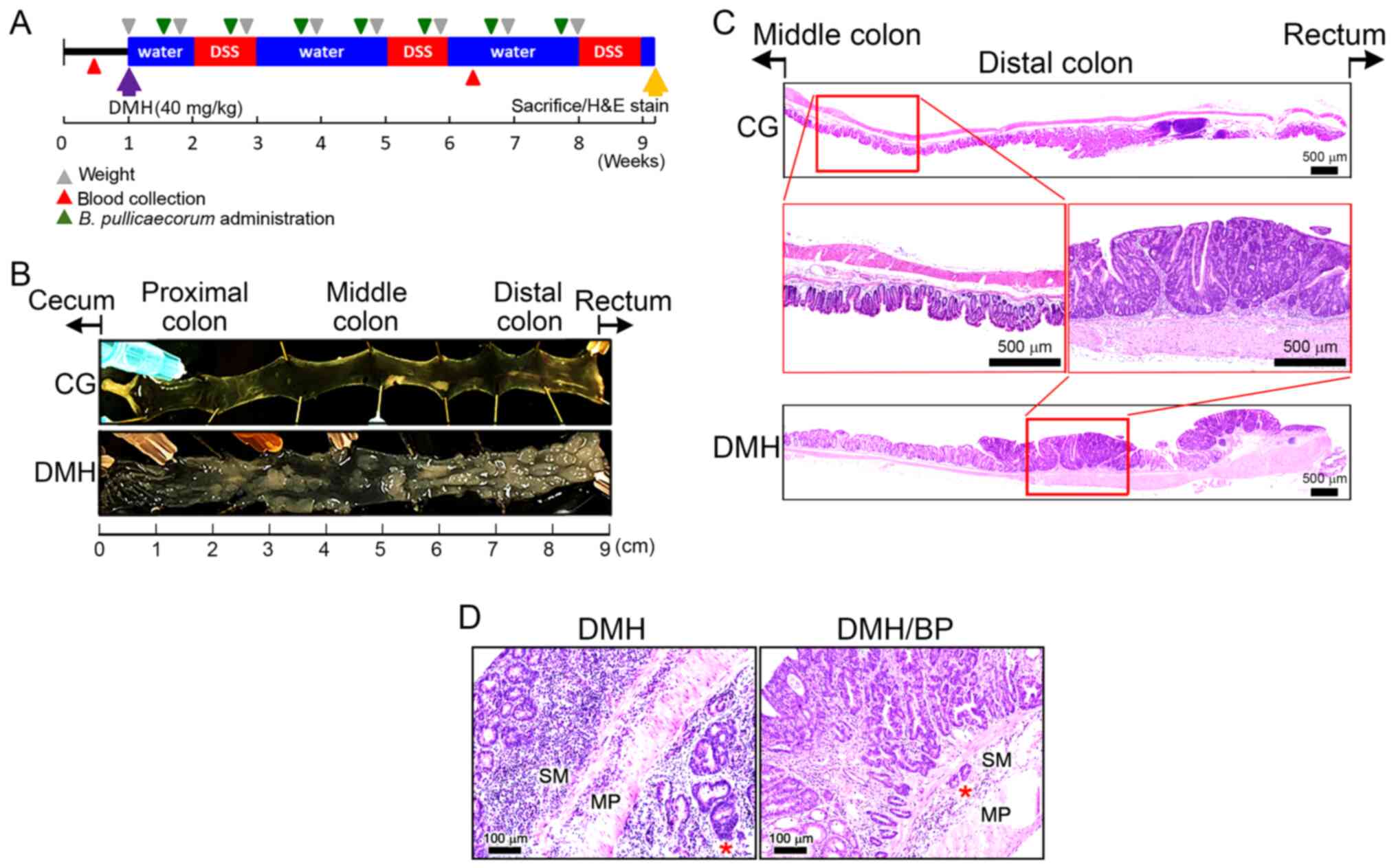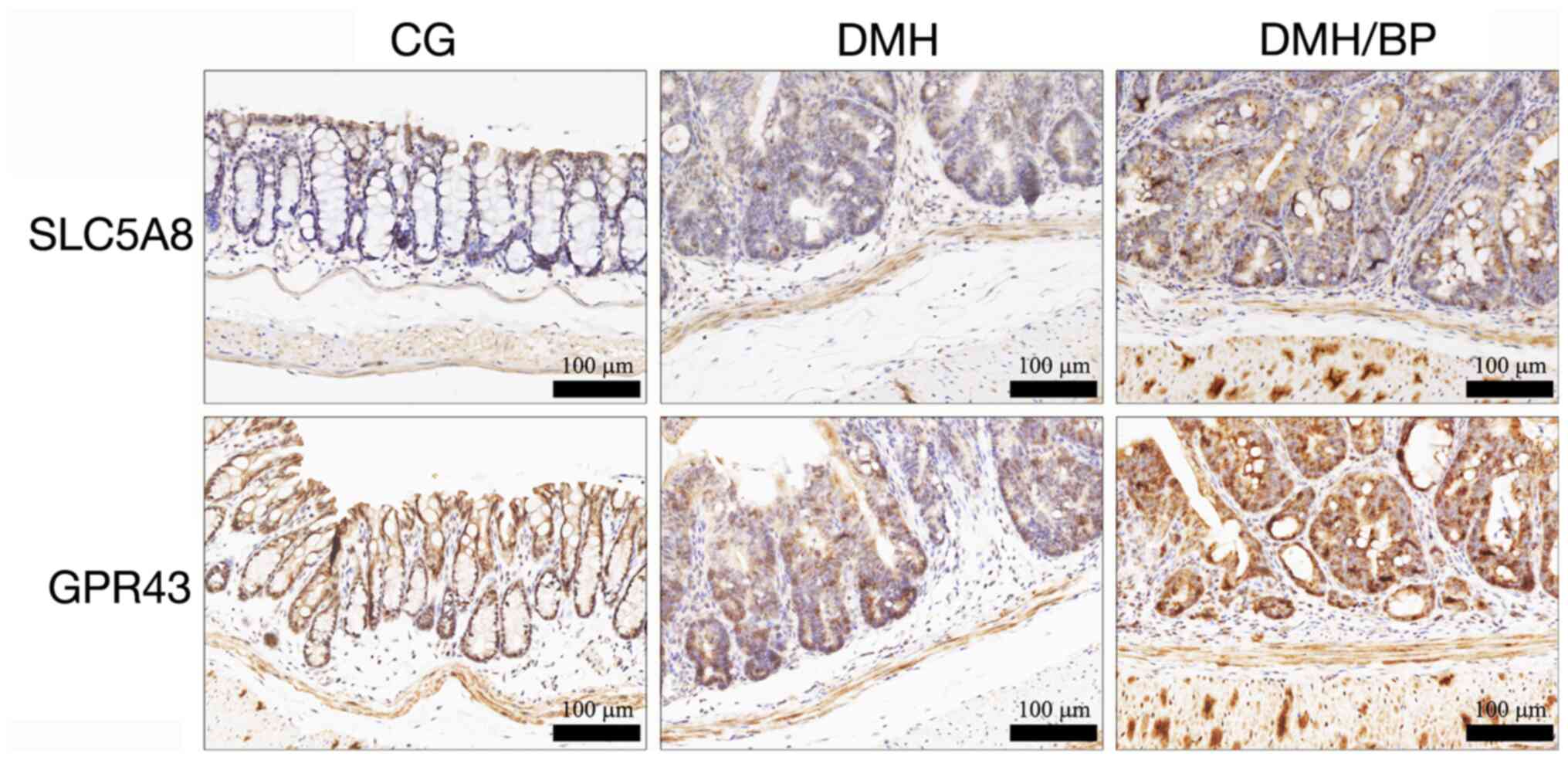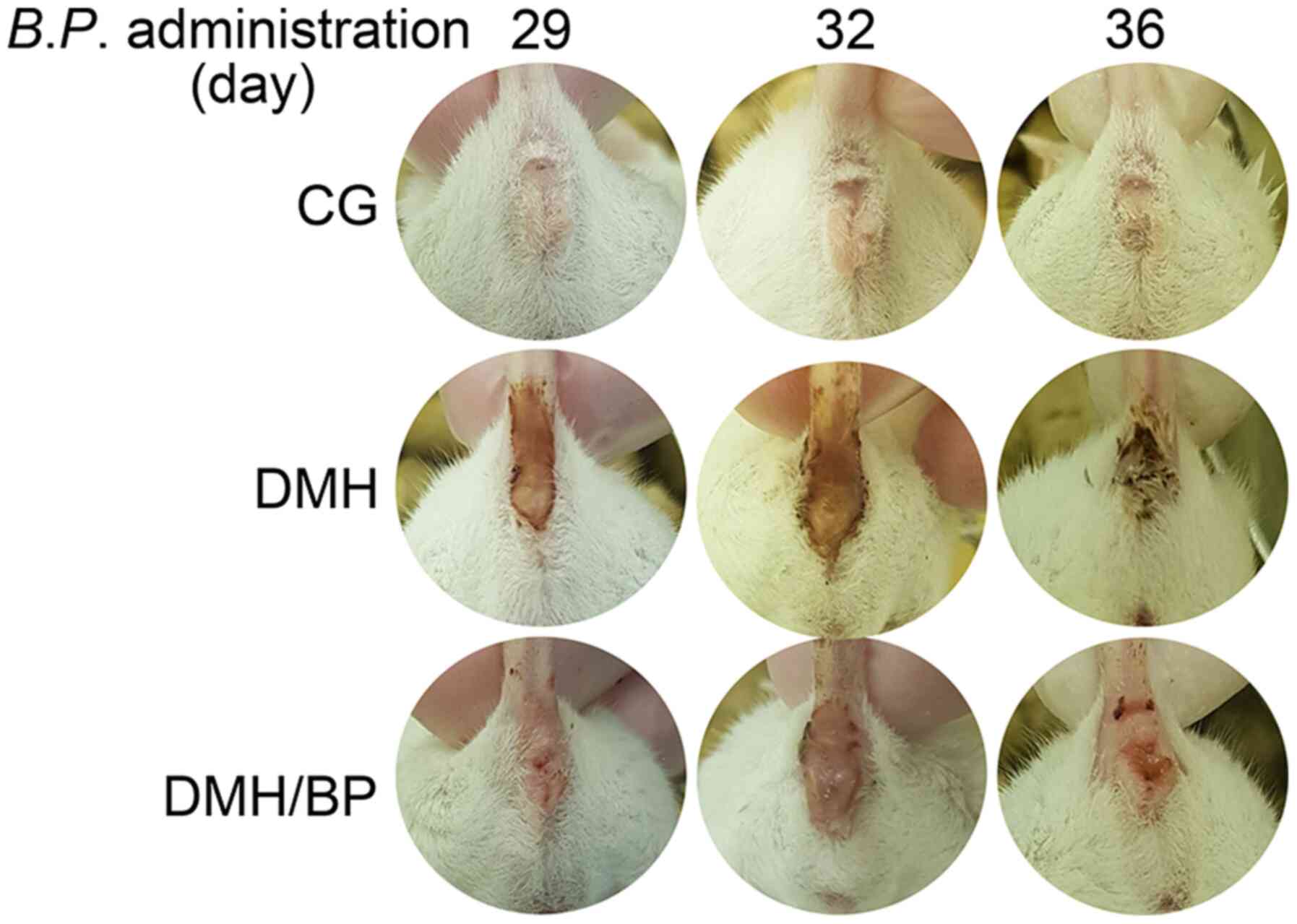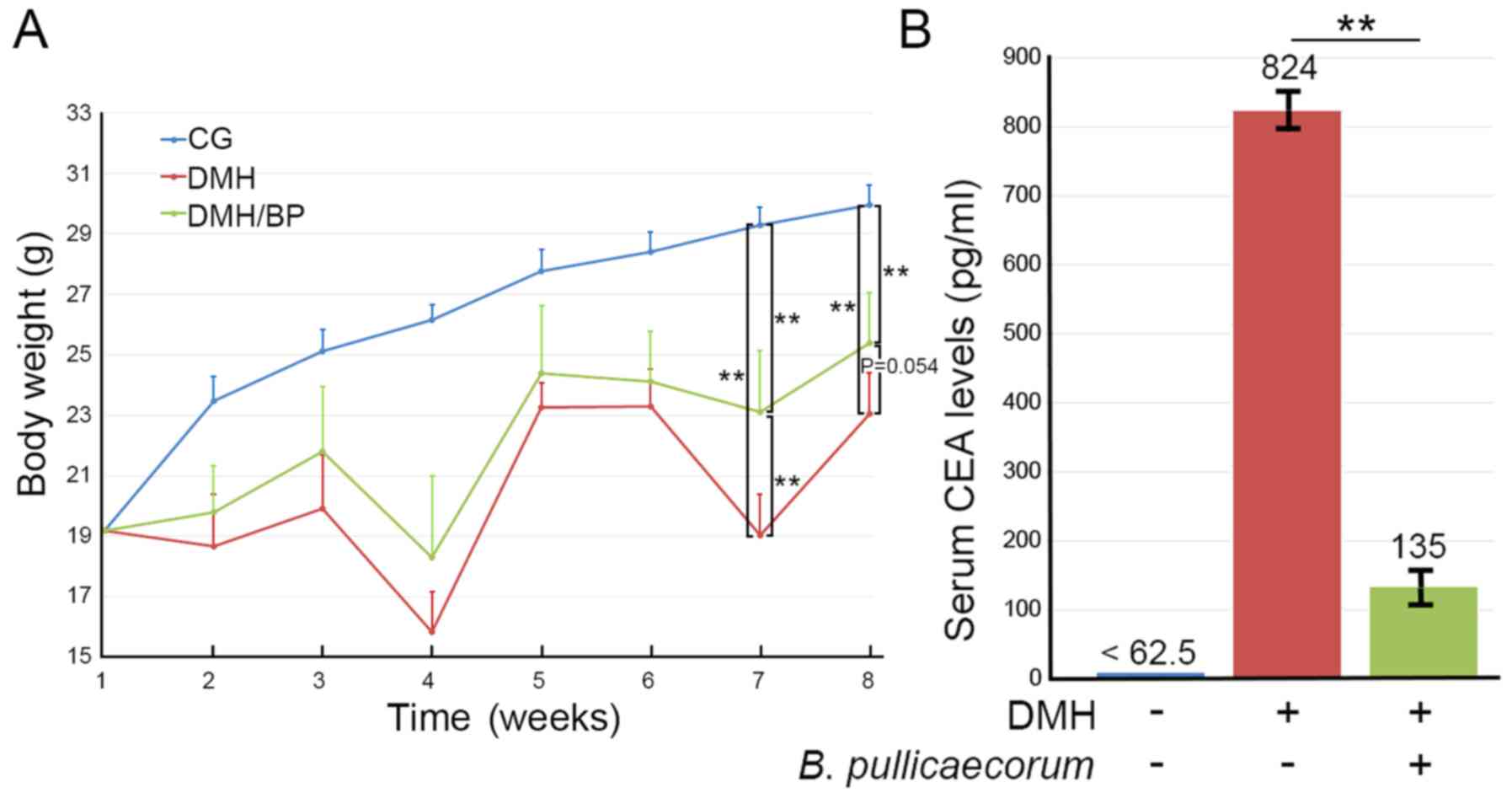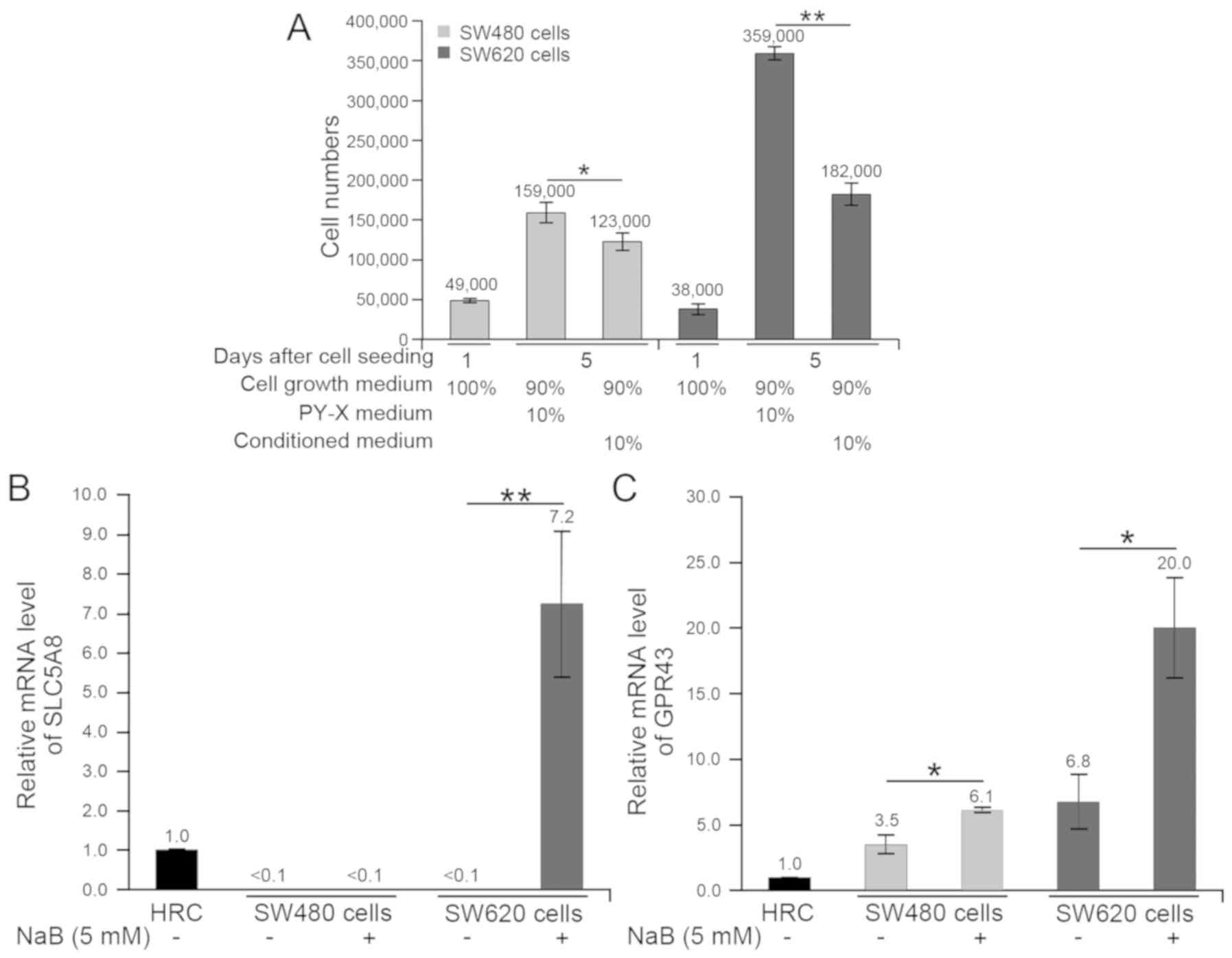|
1
|
Mima K, Ogino S, Nakagawa S, Sawayama H,
Kinoshita K, Krashima R, Ishimoto T, Imai K, Iwatsuki M, Hashimoto
D, et al: The role of intestinal bacteria in the development and
progression of gastrointestinal tract neoplasms. Surg Oncol.
26:368–376. 2017. View Article : Google Scholar : PubMed/NCBI
|
|
2
|
Zarkavelis G, Boussios S, Papadaki A,
Katsanos KH, Christodoulou DK and Pentheroudakis G: Current and
future biomarkers in colorectal cancer. Ann Gastroenterol.
30:613–621. 2017.PubMed/NCBI
|
|
3
|
Bray F, Ferlay J, Soerjomataram I, Siegel
RL, Torre LA and Jemal A: Global cancer statistics 2018: GLOBOCAN
estimates of incidence and mortality worldwide for 36 cancers in
185 countries. CA Cancer J Clin. 68:394–424. 2018. View Article : Google Scholar : PubMed/NCBI
|
|
4
|
Gonzalez-Vallinas M, Vargas T,
Moreno-Rubio J, Molina S, Herranz J, Cejas P, Burgos E, Aguayo C,
Custodio A, Reglero G, et al: Clinical relevance of the
differential expression of the glycosyltransferase gene GCNT3 in
colon cancer. Eur J Cancer. 51:1–8. 2015. View Article : Google Scholar : PubMed/NCBI
|
|
5
|
Takakura Y, Ikeda S, Imaoka Y, Urushihara
T and Itamoto T: An elevated preoperative serum carbohydrate
antigen 19-9 level is a significant predictor for peritoneal
dissemination and poor survival in colorectal cancer. Colorectal
Dis. 17:417–425. 2015. View Article : Google Scholar : PubMed/NCBI
|
|
6
|
Tilg H, Adolph TE, Gerner RR and Moschen
AR: The intestinal microbiota in colorectal cancer. Cancer Cell.
33:954–964. 2018. View Article : Google Scholar : PubMed/NCBI
|
|
7
|
Kisiel JB, Klepp P, Allawi HT, Taylor WR,
Giakoumopoulos M, Sander T, Yab TC, Moum BA, Lidgard GP, Brackmann
S, et al: Analysis of DNA methylation at specific loci in stool
samples detects colorectal cancer and high-grade dysplasia in
patients with inflammatory bowel disease. Clin Gastroenterol
Hepatol. 17:914–921.e5. 2019. View Article : Google Scholar : PubMed/NCBI
|
|
8
|
Huang CJ, Yang SH, Lee CL, Cheng YC, Tai
SY and Chien CC: Ribosomal protein S27-like in colorectal cancer: A
candidate for predicting prognoses. PLoS One. 8:e670432013.
View Article : Google Scholar : PubMed/NCBI
|
|
9
|
Huang CJ, Lee CL, Yang SH, Chien CC, Huang
CC, Yang RN and Chang CC: Upregulation of the growth
arrest-specific-2 in recurrent colorectal cancers, and its
susceptibility to chemotherapy in a model cell system. Biochim
Biophys Acta. 1862:1345–1353. 2016. View Article : Google Scholar : PubMed/NCBI
|
|
10
|
Kimura Y, Sumiyoshi M and Baba K:
Antitumor activities of synthetic and natural stilbenes through
antiangiogenic action. Cancer Sci. 99:2083–2096. 2008.PubMed/NCBI
|
|
11
|
Watine JC and Bunting PS: Mass colorectal
cancer screening: Methodological quality of practice guidelines is
not related to their content validity. Clin Biochem. 41:459–466.
2008. View Article : Google Scholar : PubMed/NCBI
|
|
12
|
Cremonesi E, Governa V, Garzon JFG, Mele
V, Amicarella F, Muraro MG, Trella E, Galati-Fournier V, Oertli D,
Däster SR, et al: Gut microbiota modulate T cell trafficking into
human colorectal cancer. Gut. 67:1984–1994. 2018. View Article : Google Scholar : PubMed/NCBI
|
|
13
|
Ahmed FE: miRNA as markers for the
diagnostic screening of colon cancer. Expert Rev Anticancer Ther.
14:463–485. 2014. View Article : Google Scholar : PubMed/NCBI
|
|
14
|
Nishioka Y, Ueki T, Hokazono K, Nagayoshi
K and Tanaka M: Comparative detection of aberrantly methylated DNA
in preoperative and postoperative stool from patients with
colorectal cancers. Int J Biol Markers. 30:e81–e87. 2015.
View Article : Google Scholar : PubMed/NCBI
|
|
15
|
Pittman ME: Fecal microbiota and screening
for colorectal cancer. Clin Chem. 64:1273–1274. 2018. View Article : Google Scholar : PubMed/NCBI
|
|
16
|
Bishop KS, Xu H and Marlow G: Epigenetic
regulation of gene expression induced by butyrate in colorectal
cancer: Involvement of MicroRNA. Genet Epigenet.
9:1179237X177299002017. View Article : Google Scholar : PubMed/NCBI
|
|
17
|
Wang T, Cai G, Qiu Y, Fei N, Zhang M, Pang
X, Jia W, Cai S and Zhao L: Structural segregation of gut
microbiota between colorectal cancer patients and healthy
volunteers. ISME J. 6:320–329. 2012. View Article : Google Scholar : PubMed/NCBI
|
|
18
|
Wang Y, Huang D, Chen KY, Cui M, Wang W,
Huang X, Awadellah A, Li Q, Friedman A, Xin WW, et al: Fucosylation
deficiency in mice leads to colitis and adenocarcinoma.
Gastroenterology. 152:193–205.e10. 2017. View Article : Google Scholar : PubMed/NCBI
|
|
19
|
Puertollano E, Kolida S and Yaqoob P:
Biological significance of short-chain fatty acid metabolism by the
intestinal microbiome. Curr Opin Clin Nutr Metab Care. 17:139–144.
2014. View Article : Google Scholar : PubMed/NCBI
|
|
20
|
Wang G, Yu Y, Wang YZ, Wang JJ, Guan R,
Sun Y, Shi F, Gao J and Fu XL: Role of SCFAs in gut microbiome and
glycolysis for colorectal cancer therapy. J Cell Physiol.
234:17023–17049. 2019. View Article : Google Scholar : PubMed/NCBI
|
|
21
|
Huang CC, Shen MH, Chen SK, Yang SH, Liu
CY, Guo JW, Chang KW and Huang CJ: Gut butyrate-producing organisms
correlate to placenta specific 8 protein: Importance to colorectal
cancer progression. J Adv Res. 22:7–20. 2019. View Article : Google Scholar : PubMed/NCBI
|
|
22
|
Li JY, Yu M, Pal S, Tyagi AM, Dar H, Adams
J, Weitzmann MN, Jones RM and Pacifici R: Parathyroid
hormone-dependent bone formation requires butyrate production by
intestinal microbiota. J Clin Invest. 130:1767–1781. 2020.
View Article : Google Scholar : PubMed/NCBI
|
|
23
|
Rosser EC, Piper CJM, Matei DE, Blair PA,
Rendeiro AF, Orford M, Alber DG, Krausgruber T, Catalan D, Klein N,
et al: Microbiota-derived metabolites suppress arthritis by
amplifying aryl-hydrocarbon receptor activation in regulatory B
cells. Cell Metab. 31:837–851.e10. 2020. View Article : Google Scholar : PubMed/NCBI
|
|
24
|
Ganapathy V, Thangaraju M, Prasad PD,
Martin PM and Singh N: Transporters and receptors for short-chain
fatty acids as the molecular link between colonic bacteria and the
host. Curr Opin Pharmacol. 13:869–874. 2013. View Article : Google Scholar : PubMed/NCBI
|
|
25
|
Bartoszek A, Moo EV, Binienda A, Fabisiak
A, Krajewska JB, Mosińska P, Niewinna K, Tarasiuk A, Martemyanov K,
Salaga M and Fichna J: Free fatty acid receptors as new potential
therapeutic target in inflammatory bowel diseases. Pharmacol Res.
152:1046042020. View Article : Google Scholar : PubMed/NCBI
|
|
26
|
Zhao Y, Chen F, Wu W, Sun M, Bilotta AJ,
Yao S, Xiao Y, Huang X, Eaves-Pyles TD, Golovko G, et al: GPR43
mediates microbiota metabolite SCFA regulation of antimicrobial
peptide expression in intestinal epithelial cells via activation of
mTOR and STAT3. Mucosal Immunol. 11:752–762. 2018. View Article : Google Scholar : PubMed/NCBI
|
|
27
|
Chen J, Xuan YH, Luo MX, Ni XG, Ling LQ,
Hu SJ, Chen JQ, Xu JY, Jiang LY, Si WZ, et al: Kaempferol
alleviates acute alcoholic liver injury in mice by regulating
intestinal tight junction proteins and butyrate receptors and
transporters. Toxicology. 429:1523382020. View Article : Google Scholar : PubMed/NCBI
|
|
28
|
Boesmans L, Valles-Colomer M, Wang J,
Eeckhaut V, Falony G, Ducatelle R, Van Immerseel F, Raes J and
Verbeke K: Butyrate producers as potential next-generation
probiotics: Safety assessment of the administration of
Butyricicoccus pullicaecorum to healthy volunteers.
mSystems. 3:e00094–18. 2018. View Article : Google Scholar : PubMed/NCBI
|
|
29
|
Eeckhaut V, Wang J, Van Parys A,
Haesebrouck F, Joossens M, Falony G, Raes J, Ducatelle R and Van
Immerseel F: The Probiotic Butyricicoccus pullicaecorum
reduces feed conversion and protects from potentially harmful
intestinal microorganisms and necrotic enteritis in broilers. Front
Microbiol. 7:14162016. View Article : Google Scholar : PubMed/NCBI
|
|
30
|
McGrath JC, Drummond GB, McLachlan EM,
Kilkenny C and Wainwright CL: Guidelines for reporting experiments
involving animals: The ARRIVE guidelines. Br J Pharmacol.
160:1573–1576. 2010. View Article : Google Scholar : PubMed/NCBI
|
|
31
|
Hampshire VA and Gilbert SH: Refinement,
reduction, and replacement (3R) strategies in preclinical testing
of medical devices. Toxicol Pathol. 47:329–338. 2019. View Article : Google Scholar : PubMed/NCBI
|
|
32
|
Vidali S, Aminzadeh-Gohari S, Feichtinger
RG, Vatrinet R, Koller A, Locker F, Rutherford T, O'Donnell M,
Stöger-Kleiber A, Lambert B, et al: The ketogenic diet is not
feasible as a therapy in a CD-1 nu/nu mouse model of renal cell
carcinoma with features of Stauffer's syndrome. Oncotarget.
8:57201–57215. 2017. View Article : Google Scholar : PubMed/NCBI
|
|
33
|
De Robertis M, Massi E, Poeta ML, Carotti
S, Morini S, Cecchetelli L, Signori E and Fazio VM: The AOM/DSS
murine model for the study of colon carcinogenesis: From pathways
to diagnosis and therapy studies. J Carcinog. 10:92011. View Article : Google Scholar : PubMed/NCBI
|
|
34
|
Rueden CT, Schindelin J, Hiner MC, DeZonia
BE, Walter AE, Arena ET and Eliceiri KW: ImageJ2: ImageJ for the
next generation of scientific image data. BMC Bioinformatics.
18:5292017. View Article : Google Scholar : PubMed/NCBI
|
|
35
|
Hung CS, Wang YC, Guo JW, Yang RN, Lee CL,
Shen MH, Huang CC, Huang CJ, Yang JY and Liu CY: Expression pattern
of placenta specific 8 and keratin 20 in different types of
gastrointestinal cancer. Mol Med Rep. 21:659–666. 2020.PubMed/NCBI
|
|
36
|
Livak KJ and Schmittgen TD: Analysis of
relative gene expression data using real-time quantitative PCR and
the 2(-Delta Delta C(T)) method. Methods. 25:402–408. 2001.
View Article : Google Scholar : PubMed/NCBI
|
|
37
|
Fischer AH, Jacobson KA, Rose J and Zeller
R: Hematoxylin and eosin staining of tissue and cell sections. CSH
Protoc. 2008:pdb.prot4986. 2008.
|
|
38
|
Kim JJ, Shajib MS, Manocha MM and Khan WI:
Investigating intestinal inflammation in DSS-induced model of IBD.
J Vis Exp. 60:36782012.
|
|
39
|
Vargason AM and Anselmo AC: Clinical
translation of microbe-based therapies: Current clinical landscape
and preclinical outlook. Bioeng Transl Med. 3:124–137. 2018.
View Article : Google Scholar : PubMed/NCBI
|
|
40
|
Shah MS, DeSantis T, Yamal JM, Weir T,
Ryan EP, Cope JL and Hollister EB: Re-purposing 16S rRNA gene
sequence data from within case paired tumor biopsy and
tumor-adjacent biopsy or fecal samples to identify microbial
markers for colorectal cancer. PLoS One. 13:e02070022018.
View Article : Google Scholar : PubMed/NCBI
|
|
41
|
Gao C, Ganesh BP, Shi Z, Shah RR, Fultz R,
Major A, Venable S, Lugo M, Hoch K, Chen X, et al: Gut
microbe-mediated suppression of inflammation-associated colon
carcinogenesis by luminal histamine production. Am J Pathol.
187:2323–2336. 2017. View Article : Google Scholar : PubMed/NCBI
|
|
42
|
Eeckhaut V, Van Immerseel F, Teirlynck E,
Pasmans F, Fievez V, Snauwaert C, Haesebrouck F, Ducatelle R, Louis
P and Vandamme P: Butyricicoccus pullicaecorum gen. nov.,
sp. nov., an anaerobic, butyrate-producing bacterium isolated from
the caecal content of a broiler chicken. Int J Syst Evol Microbiol.
58:2799–2802. 2008. View Article : Google Scholar : PubMed/NCBI
|
|
43
|
Sitkin S and Pokrotnieks J: Clinical
potential of anti-inflammatory effects of faecalibacterium
prausnitzii and butyrate in inflammatory bowel disease. Inflamm
Bowel Dis. 25:e40–e41. 2019. View Article : Google Scholar : PubMed/NCBI
|
|
44
|
Eeckhaut V, Machiels K, Perrier C, Romero
C, Maes S, Flahou B, Steppe M, Haesebrouck F, Sas B, Ducatelle R,
et al: Butyricicoccus pullicaecorum in inflammatory bowel
disease. Gut. 62:1745–1752. 2013. View Article : Google Scholar : PubMed/NCBI
|
|
45
|
Kurata N, Tokashiki N, Fukushima K,
Hasuoka N, Kitagawa K, Mashimo M, Regan JW, Murayama T and Fujino
H: Short chain fatty acid butyrate uptake reduces expressions of
prostanoid EP4 receptors and their mediation of cyclooxygenase-2
induction in HCA-7 human colon cancer cells. Eur J Pharmacol.
853:308–315. 2019. View Article : Google Scholar : PubMed/NCBI
|
|
46
|
Kazemi Sefat NA, Mohammadi MM, Hadjati J,
Talebi S, Ajami M and Daneshvar H: Sodium butyrate as a histone
deacetylase inhibitor affects toll-like receptor 4 expression in
colorectal cancer cell lines. Immunol Invest. 48:759–769. 2019.
View Article : Google Scholar : PubMed/NCBI
|
|
47
|
Luo S, Li Z, Mao L, Chen S and Sun S:
Sodium butyrate induces autophagy in colorectal cancer cells
through LKB1/AMPK signaling. J Physiol Biochem. 75:53–63. 2019.
View Article : Google Scholar : PubMed/NCBI
|
|
48
|
Zhou Q, Li G, Zuo S, Zhu W and Yuan X: RNA
sequencing analysis of molecular basis of sodium butyrate-induced
growth inhibition on colorectal cancer cell lines. Biomed Res Int.
2019:14278712019. View Article : Google Scholar : PubMed/NCBI
|
|
49
|
Pirozzi C, Francisco V, Guida FD, Gómez R,
Lago F, Pino J, Meli R and Gualillo O: Butyrate modulates
inflammation in chondrocytes via GPR43 receptor. Cell Physiol
Biochem. 51:228–243. 2018. View Article : Google Scholar : PubMed/NCBI
|
|
50
|
Gopal E, Miyauchi S, Martin PM, Ananth S,
Roon P, Smith SB and Ganapathy V: Transport of nicotinate and
structurally related compounds by human SMCT1 (SLC5A8) and its
relevance to drug transport in the mammalian intestinal tract.
Pharm Res. 24:575–584. 2007. View Article : Google Scholar : PubMed/NCBI
|
|
51
|
Cimadamore A, Santoni M, Massari F,
Gasparrini S, Cheng L, Lopez-Beltran A, Montironi R and Scarpelli
M: Microbiome and cancers, with focus on genitourinary tumors.
Front Oncol. 9:1782019. View Article : Google Scholar : PubMed/NCBI
|
|
52
|
Gurav A, Sivaprakasam S, Bhutia YD,
Boettger T, Singh N and Ganapathy V: Slc5a8, a Na+-coupled
high-affinity transporter for short-chain fatty acids, is a
conditional tumour suppressor in colon that protects against
colitis and colon cancer under low-fibre dietary conditions.
Biochem J. 469:267–278. 2015. View Article : Google Scholar : PubMed/NCBI
|
|
53
|
Zaiss MM, Jones RM, Schett G and Pacifici
R: The gut-bone axis: How bacterial metabolites bridge the
distance. J Clin Invest. 129:3018–3028. 2019. View Article : Google Scholar : PubMed/NCBI
|
|
54
|
Chen JS, Faller DV and Spanjaard RA:
Short-chain fatty acid inhibitors of histone deacetylases:
Promising anticancer therapeutics? Curr Cancer Drug Targets.
3:219–236. 2003. View Article : Google Scholar : PubMed/NCBI
|
|
55
|
Singh N, Thangaraju M, Prasad PD, Martin
PM, Lambert NA, Boettger T, Offermanns S and Ganapathy V: Blockade
of dendritic cell development by bacterial fermentation products
butyrate and propionate through a transporter (Slc5a8)-dependent
inhibition of histone deacetylases. J Biol Chem. 285:27601–27608.
2010. View Article : Google Scholar : PubMed/NCBI
|
|
56
|
Turowski GA, Rashid Z, Hong F, Madri JA
and Basson MD: Glutamine modulates phenotype and stimulates
proliferation in human colon cancer cell lines. Cancer Res.
54:5974–5980. 1994.PubMed/NCBI
|
|
57
|
Leibovitz A, Stinson JC, McCombs WB III,
McCoy CE, Mazur KC and Mabry ND: Classification of human colorectal
adenocarcinoma cell lines. Cancer Res. 36:4562–4569.
1976.PubMed/NCBI
|
|
58
|
Gupta N, Martin PM, Prasad PD and
Ganapathy V: SLC5A8 (SMCT1)-mediated transport of butyrate forms
the basis for the tumor suppressive function of the transporter.
Life Sci. 78:2419–2425. 2006. View Article : Google Scholar : PubMed/NCBI
|
|
59
|
Tang Y, Chen Y, Jiang H, Robbins GT and
Nie D: G-protein-coupled receptor for short-chain fatty acids
suppresses colon cancer. Int J Cancer. 128:847–856. 2011.
View Article : Google Scholar : PubMed/NCBI
|
|
60
|
Thangaraju M, Cresci GA, Liu K, Ananth S,
Gnanaprakasam JP, Browning DD, Mellinger JD, Smith SB, Digby GJ,
Lambert NA, et al: GPR109A is a G-protein-coupled receptor for the
bacterial fermentation product butyrate and functions as a tumor
suppressor in colon. Cancer Res. 69:2826–2832. 2009. View Article : Google Scholar : PubMed/NCBI
|
|
61
|
Eslami M, Yousefi B, Kokhaei P, Hemati M,
Nejad ZR, Arabkari V and Namdar A: Importance of probiotics in the
prevention and treatment of colorectal cancer. J Cell Physiol.
234:17127–17143. 2019. View Article : Google Scholar : PubMed/NCBI
|
|
62
|
Gui Q, Li H, Wang A, Zhao X, Tan Z, Chen
L, Xu K and Xiao C: The association between gut butyrate-producing
bacteria and non-small-cell lung cancer. J Clin Lab Anal.
34:e233182020. View Article : Google Scholar : PubMed/NCBI
|
|
63
|
Zeng X, Gao X, Peng Y, Wu Q, Zhu J, Tan C,
Xia G, You C, Xu R, Pan S, et al: Higher risk of stroke is
correlated with increased opportunistic pathogen load and reduced
levels of butyrate-producing bacteria in the gut. Front Cell Infect
Microbiol. 9:42019. View Article : Google Scholar : PubMed/NCBI
|
|
64
|
Chen D, Jin D, Huang S, Wu J, Xu M, Liu T,
Dong W, Liu X, Wang S, Zhong W, et al: Clostridium
butyricum, a butyrate-producing probiotic, inhibits intestinal
tumor development through modulating Wnt signaling and gut
microbiota. Cancer Lett. 469:456–467. 2020. View Article : Google Scholar : PubMed/NCBI
|
|
65
|
Hagihara M, Kuroki Y, Ariyoshi T, Higashi
S, Fukuda K, Yamashita R, Matsumoto A, Mori T, Mimura K, Yamaguchi
N, et al: Clostridium butyricum modulates the microbiome to
protect intestinal barrier function in mice with antibiotic-induced
dysbiosis. iScience. 23:1007722020. View Article : Google Scholar : PubMed/NCBI
|
|
66
|
Sun M, Wu W, Liu Z and Cong Y: Microbiota
metabolite short chain fatty acids, GPCR, and inflammatory bowel
diseases. J Gastroenterol. 52:1–8. 2017. View Article : Google Scholar : PubMed/NCBI
|
|
67
|
Alvarez-Mercado AI, Navarro-Oliveros M,
Robles-Sánchez C, Plaza-Díaz J, Sáez-Lara MJ, Muñoz-Quezada S,
Fontana L and Abadía-Molina F: Microbial population changes and
their relationship with human health and disease. Microorganisms.
7:682019. View Article : Google Scholar
|
|
68
|
Roduit C, Frei R, Ferstl R, Loeliger S,
Westermann P, Rhyner C, Schiavi E, Barcik W, Rodriguez-Perez N,
Wawrzyniak M, et al: High levels of butyrate and propionate in
early life are associated with protection against atopy. Allergy.
74:799–809. 2019. View Article : Google Scholar : PubMed/NCBI
|
|
69
|
Li M, van Esch BCAM, Henricks PAJ,
Folkerts G and Garssen J: The anti-inflammatory effects of short
chain fatty acids on lipopolysaccharide- or tumor necrosis factor
α-stimulated endothelial cells via activation of GPR41/43 and
inhibition of HDACs. Front Pharmacol. 9:5332018. View Article : Google Scholar : PubMed/NCBI
|
|
70
|
Scorletti E, Afolabi PR, Miles EA, Smith
DE, Almehmadi A, Alshathry A, Moyses HE, Clough GF, Wright M, Patel
J, et al: Design and rationale of the INSYTE study: A randomised,
placebo controlled study to test the efficacy of a synbiotic on
liver fat, disease biomarkers and intestinal microbiota in
non-alcoholic fatty liver disease. Contemp Clin Trials. 71:113–123.
2018. View Article : Google Scholar : PubMed/NCBI
|
|
71
|
Lau WL and Vaziri ND: Gut microbial
short-chain fatty acids and the risk of diabetes. Nat Rev Nephrol.
15:389–390. 2019. View Article : Google Scholar : PubMed/NCBI
|
|
72
|
Cornejo-Pareja I, Muñoz-Garach A,
Clemente-Postigo M and Tinahones FJ: Importance of gut microbiota
in obesity. Eur J Clin Nutr. 72 (Suppl 1):S26–S37. 2019. View Article : Google Scholar
|
|
73
|
Gill PA, van Zelm MC, Muir JG and Gibson
PR: Review article: Short chain fatty acids as potential
therapeutic agents in human gastrointestinal and inflammatory
disorders. Aliment Pharmacol Ther. 48:15–34. 2018. View Article : Google Scholar : PubMed/NCBI
|
|
74
|
Esser D, Lange J, Marinos G, Sieber M,
Best L, Prasse D, Bathia J, Rühlemann MC, Boersch K, Jaspers C and
Sommer F: Functions of the microbiota for the physiology of animal
metaorganisms. J Innate Immun. 11:393–404. 2019. View Article : Google Scholar : PubMed/NCBI
|
|
75
|
Koliarakis I, Messaritakis I, Nikolouzakis
TK, Hamilos G, Souglakos J and Tsiaoussis J: Oral bacteria and
intestinal dysbiosis in colorectal cancer. Int J Mol Sci.
20:41462019. View Article : Google Scholar
|
|
76
|
Chen J and Vitetta L:
Inflammation-modulating effect of butyrate in the prevention of
colon cancer by dietary fiber. Clin Colorectal Cancer.
17:e541–e544. 2018. View Article : Google Scholar : PubMed/NCBI
|















